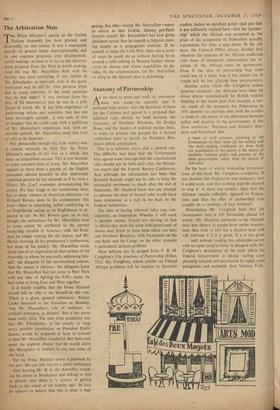Anatomy of Partnership
Awe went to press last week an announce- ment was made—so casually that it attracted little notice—that the Secretary of State for the Colonies had agreed to a proposal that informal talks should be held between the Governor of Northern Rhodesia, Sir Evelyn Hone, and the leaders of political parties there, in order to prepare the ground for a formal conference later to decide on Northern Rho- desia's future constitution.
This is a welcome move and a shrewd one. The difficulty had been that the Government here agreed some time ago that the constitutional talks should not be held until after the Monck- ton report and the Federal Review Conference. And although his information has been that Kenneth Kaunda might not be able to keep the nationalist movement in check after the end of September, Mr. Macleod knew that any attempt to advance the date of formal talks would have been interpreted as a stab in the back by the Federal Authorities.
The idea of having informal talks was, con- sequently, an inspiration. Whether it will work is another matter. Events are moving so fast Africa that even the most well-intentioned of moves may prove to have been taken too late; and Northern Rhodesia, with Nyasaland on the one flank and the Congo on the other, presents a particularly delicate problem.
How delicate can be gauged from T. R. M. Creighton's The Anatomy of Partnership (Faber, 25s.). Mr. Creighton, whose articles on Central African problems will be familiar to Spectator readers, makes an excellent point—and one that is not sufficently realised here—that the 'partner- ship' which the African was promised as the price of his acceptance of Federation actually represented, for him, a step down. In the old days, the Colonial Office always insisted that wherever the interests of the African conflicted with those of immigrant communities, the in- terests of the African must be paramount. Even if the idea of partnership had been much less of a sham than it has turned out, it would still be less alluring than paramountcy.
Another point which Mr. Creighton makes deserves attention: the Africans have been let down almost systematically by British wishful thinking in the recent past. For example, a sur- vey made of the prospects for Federation in 1951 showed—to anybody who took the trouble to study it—the extent of the differences between policy and practice in the governments of the three territories: Northern and Southern Rho- desia and Nyasaland. But a team of civil servants, reporting to the Government on their study [of the survey] said `the most striking conclusion we draw from our examination of the survey is the degree of similarity between policy and practice of the three governments, rather than the degree of difference.'
On the basis of utterly misleading interpreta- tions of this kind, Mr. Creighton complains, 'it was decided that Federation was necessary, that it could work, and that nothing must be allowed to stop it.' Is there any wonder, then, that the Africans remain inflexibly opposed to Federa- tion; and that the offer of partnership may actually be a reminder of past betrayal?
Nevertheless Mr. Creighton feels that the Government here is still favourably placed for action: Mr. Macleod represents to the Africans their best chance to escape from settler domina- tion; they look to him for a decisive lead, and will welcome it if it is given. If it is not given . . . well, nobody reading this admirable survey with an open mind is likely to disagree with Mr. Creighton's description of the path which the Federal Government is taking--`sailing com- placently towards self-destruction in rapids more precipitous and turbulent than Victoria Falls.'










































 Previous page
Previous page